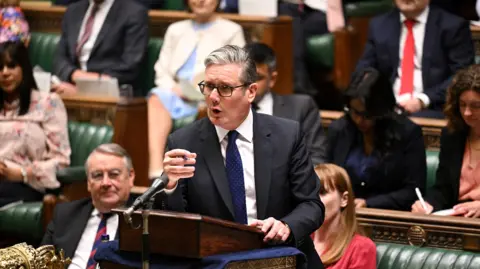Starmer faces Labour revolt despite welfare climbdown
 House of Commons
House of CommonsPrime Minister Sir Keir Starmer is braced for the biggest rebellion of his premiership in a vote on planned benefits cuts, despite making significant concessions to discontented Labour MPs.
Sir Keir and his ministers have been scrambling to convince MPs to back watered-down welfare changes in a key vote on Tuesday evening.
In a bid to win over rebel Labour MPs, the prime minister softened the package by limiting disability benefit cuts to only new claimants, among other tweaks.
But dozens of Labour MPs still have misgivings about the government's welfare policies and could defy the prime minister in the vote later.
Ministers were forced to offer concessions last week after more than 120 Labour MPs threatened to back a so-called reasoned amendment to block the legislation required to deliver the plans.
That amendment has now been withdrawn, but a fresh bid to stop the draft law in its tracks has been signed by 39 Labour MPs.
The new amendment has been selected for a vote later by Commons Speaker Sir Lindsay Hoyle.
It would take 83 Labour backbenchers to vote against the bill - along with the other opposition parties - to defeat the government.
Rachael Maskell, the Labour MP who tabled the amendment, told the BBC "loads more" of her colleagues were prepared to vote against the government on welfare.
"I engaged with so many people yesterday who said I'm not signing your reasoned amendment but I am voting down the bill," Maskell said.
She said she had no fear in voting down the bill and felt a "moral duty" to "speak up for" disabled people.
The original bill included proposals to restrict eligibility for the personal independence payment (Pip), the main disability benefit in England, Wales and Northern Ireland, and freeze the health-related element of universal credit.
But in a bid to win rebels over, the government has now said the new stricter criteria will only apply to new claimants, and plans to freeze the health-related component of universal credit have been reversed.
The concession means the welfare reforms will only save about £2bn a year, rather than the £4.8bn they were expected to save by 2030.
In a stormy Commons session on Monday, Work and Pensions Secretary Liz Kendall defended the bill, but faced continued questions from Labour MPs over the rollout of the changes.
Ministers have promised a review into the assessment process for Pip in partnership with disability organisations.
But many backbenchers have questioned the rationale for making changes to the benefits system before that review, to be led by Disability Minister Sir Stephen Timms, concludes in autumn 2026.
The Conservative leader, Kemi Badenoch, told the BBC her party would vote against the measures
"The benefits bill is too high," she said.
"It was £40bn just before Covid. It is now projected to be a £100bn by 2030. And what Labour is doing is not making any savings at all. It's just reducing the rate of increase. That's why we are not supporting it."
The Liberal Democrats have called for proposals to be suspended so they can be further looked at.
Liberal Democrat leader Sir Ed Davey said the Timms review must "listen carefully to carers' charities to understand the impact these changes will have, on family carers themselves, on the NHS and social care".
Some MPs have said the reforms will not be as effective as the government hopes.
"I strongly believe that these kind of punitive measures of cutting welfare are not going to have the outcomes that we've been told they will," said Olivia Blake, Labour MP for Sheffield Hallam, who is disabled and opposes the reforms.
"I think it will just be about saving money but will actually move spending into areas such as housing services, the NHS and social care," she told the BBC.
Blake added that some MPs were still considering their vote, saying the rebellion would be "more significant than maybe people realise".
Modelling published by Department for Work and Pensions suggested around 150,000 people might be pushed into poverty by 2030 because of the welfare cuts - lower than the original 250,000 figure estimated before the government made the concessions.
Sir Stephen told the BBC the net effect of the government's policies would reduce poverty - including the measures to help people into work.
He also stressed the need to make Pip sustainable in the future.
Ministers hope their reforms will boost employment among benefits recipients, at a time when 2.8 million people are economically inactive due to long-term sickness.
If nothing changes, the health and disability benefits bill is forecast to reach £70bn a year by the end of the decade, a level of spending the government says is "unsustainable".
